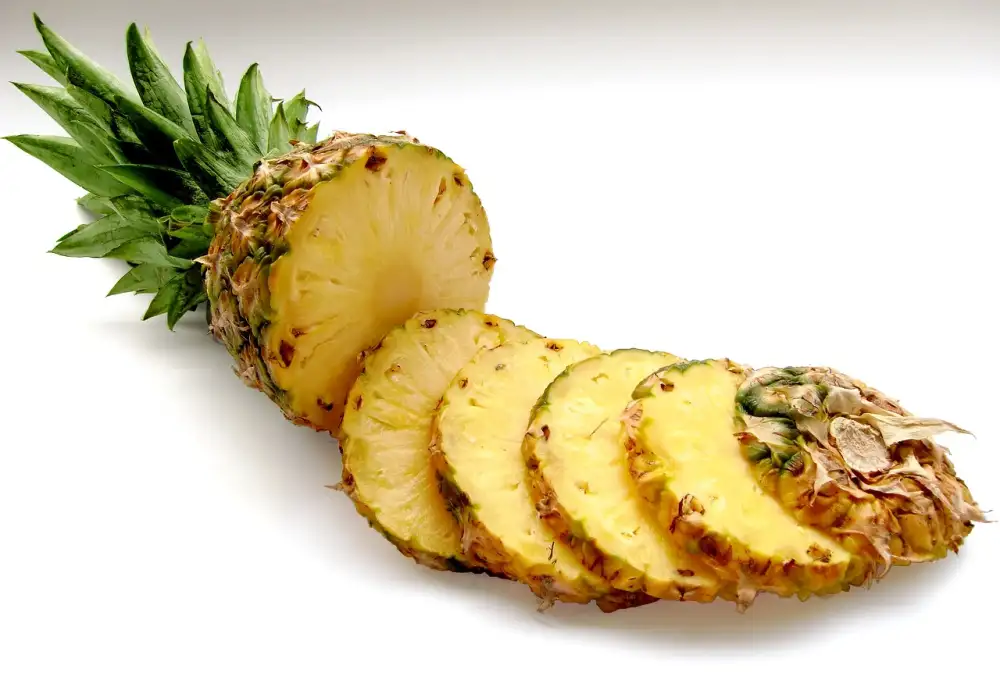Why Does Pineapple Cause Mouth Discomfort? Unveiling the Culprit Behind the Pain

Pineapple, with its juicy sweetness and tropical allure, is a beloved fruit enjoyed by many. However, for some unfortunate individuals, indulging in this delectable fruit can lead to an uncomfortable sensation in the mouth. This mysterious phenomenon has left many wondering why pineapple causes such discomfort. In this article, we will delve into the science behind this peculiar reaction and uncover the culprit responsible for the pain. By understanding the reasons behind pineapple mouth discomfort, we can better appreciate and enjoy this exotic fruit while minimizing any unpleasant side effects.
The Enzyme Behind the Sensation: Bromelain
Have you ever wondered why eating pineapple can sometimes leave your mouth feeling uncomfortable? The answer lies in an enzyme called bromelain. Bromelain is a powerful protein-digesting enzyme found in pineapples that plays a significant role in causing mouth discomfort.
Bromelain is known for its ability to break down proteins, which is why it is commonly used as a meat tenderizer. When we consume pineapple, bromelain comes into contact with the proteins present in our mouths, including those in our taste buds and oral tissues.
This interaction between bromelain and proteins triggers a series of chemical reactions that can lead to inflammation and irritation. As a result, some people experience a tingling or burning sensation in their mouths after eating pineapple.
It's important to note that the level of bromelain in pineapple can vary depending on factors such as ripeness and processing methods. This means that some pineapples may have higher levels of bromelain, leading to more intense mouth discomfort.
In the next section, we will explore how bromelain's impact on oral tissues contributes to the overall sensation experienced when consuming pineapple.
Bromelain's Impact on Oral Tissues
Bromelain, the enzyme found in pineapple, is responsible for the discomfort it causes in our mouths. When we consume pineapple, bromelain comes into contact with our oral tissues, including the tongue and cheeks. This enzyme breaks down proteins, which can lead to irritation and inflammation of these tissues. The result is a prickling or stinging sensation that many people experience after eating pineapple. While this reaction may be unpleasant, it is important to note that it is temporary and harmless.
The Role of Acids in Pineapple
One of the factors contributing to pineapple mouth discomfort is its high acidity. Pineapples contain citric acid, malic acid, and ascorbic acid, which give them their tangy taste. These acids can cause irritation and a stinging sensation when they come into contact with sensitive oral tissues.
The acidic nature of pineapples can also lead to the erosion of tooth enamel over time. Enamel is the protective outer layer of teeth, and prolonged exposure to acids can weaken it, making teeth more susceptible to cavities and sensitivity.
However, it's important to note that the acids in pineapples are not solely responsible for causing mouth discomfort. The enzyme bromelain also plays a significant role in this sensation, as discussed earlier.
To minimize the impact of acids on your oral health, it is advisable to consume pineapple in moderation and rinse your mouth with water after eating it. Additionally, practicing good oral hygiene habits such as brushing twice a day and using fluoride toothpaste can help protect your teeth from acid erosion.
By understanding the role of acids in pineapple and taking necessary precautions, you can continue to enjoy this tropical fruit without experiencing excessive mouth discomfort or compromising your dental health.
Pineapple Allergy or Sensitivity: Exploring the Possibilities
While most people can enjoy pineapple without any issues, some individuals may experience mouth discomfort due to an allergic reaction or sensitivity. Pineapple allergy is relatively rare but can cause symptoms such as itching, swelling, and even difficulty breathing. These reactions are typically triggered by proteins found in pineapple, including bromelain.
On the other hand, pineapple sensitivity is more common and less severe. It can manifest as a tingling or burning sensation in the mouth after consuming pineapple. This sensitivity is often attributed to the acids present in pineapple, which can irritate the delicate tissues of the mouth.
It's important to note that true allergies to pineapple are rare, and most cases of mouth discomfort are due to sensitivity rather than an allergic reaction. If you suspect that you have a pineapple allergy or sensitivity, it's best to consult with a healthcare professional for proper diagnosis and guidance.
In some cases, individuals who are allergic to latex may also experience cross-reactivity with certain fruits like pineapples. This means that if you have a latex allergy, you may be more likely to develop an allergic reaction to pineapples as well.
If you experience any adverse reactions after consuming pineapple, it's essential to pay attention and seek medical advice if necessary. Understanding your body's response will help you make informed decisions about incorporating pineapple into your diet.
Next, we will explore some tips on how to minimize mouth discomfort when enjoying this tropical fruit.
Tips to Minimize Pineapple Mouth Discomfort
1. Pair pineapple with other foods: Combining pineapple with other foods can help dilute the concentration of bromelain and acids, reducing the discomfort. Try adding pineapple to a fruit salad or mixing it with yogurt.
2. Cook or grill pineapple: Heating pineapple can deactivate bromelain, making it less likely to cause mouth discomfort. Grilling or cooking pineapple can also enhance its flavor and texture.
3. Choose ripe pineapples: Ripe pineapples have lower levels of bromelain compared to unripe ones. Look for pineapples that are golden in color and give off a sweet aroma.
4. Rinse pineapple before consuming: Washing pineapple under running water can help remove some of the bromelain on the surface, reducing the chances of mouth discomfort.
5. Freeze pineapple: Freezing pineapple can also reduce the activity of bromelain. Enjoying frozen pineapple as a refreshing treat may minimize any potential discomfort.
By following these tips, you can still enjoy the unique taste and benefits of pineapple while minimizing any mouth discomfort it may cause.
While pineapple may cause mouth discomfort for some individuals, it is important to remember that this fruit offers a plethora of health benefits and culinary delights. By understanding the role of bromelain and acids in causing the sensation, we can approach consuming pineapple with awareness.
For those who experience mild discomfort, there are simple tips to minimize the effects. Slicing the pineapple into smaller pieces or cooking it can help break down bromelain and reduce its impact on oral tissues. Additionally, rinsing your mouth with water or consuming dairy products alongside pineapple can help neutralize the acids.
It is also crucial to differentiate between an allergy or sensitivity to pineapple. If you suspect an allergic reaction, seek medical advice immediately.
Instead of avoiding pineapple altogether, let us embrace this tropical fruit with caution. By being mindful of our bodies' reactions and taking necessary precautions, we can continue to enjoy the unique flavors and nutritional benefits that pineapples have to offer. So go ahead, savor the sweetness of this exotic fruit while delighting your senses!
Published: 19. 12. 2023
Category: Health



